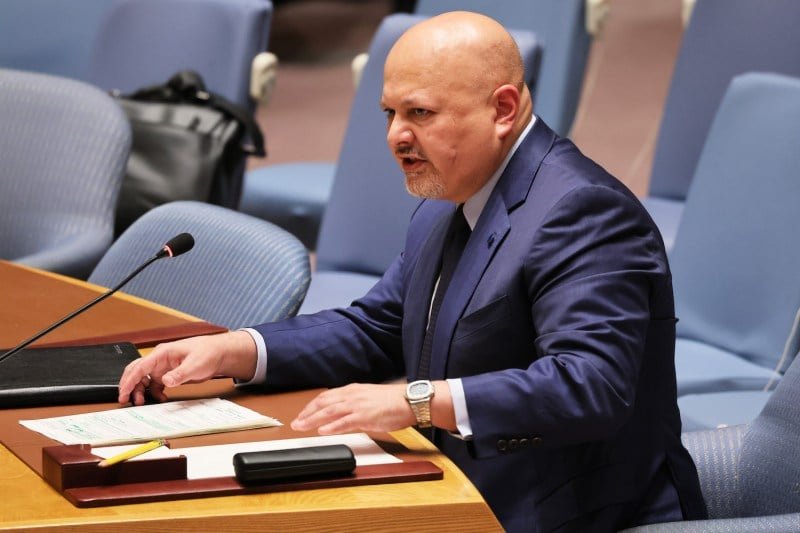Foreign Policy: Israeli Prime Minister Benjamin Netanyahu fears that the International Criminal Court (ICC) will soon charge him for alleged war crimes in Gaza and has appealed to the Joe Biden administration for help. Washington is reportedly trying to dissuade ICC chief prosecutor Karim Khan from filing charges, but its arguments, both legal and practical, are weak.
Khan has not said what he is planning, but the most likely charges will be for obstructing access to food and other humanitarian aid. Khan has already warned the Netanyahu government that this reported obstruction could lead to ICC action, and given Israel’s refusal to allow the court’s investigators into Gaza, the proof of obstruction—in the form of widely acknowledged famine conditions—is more readily available than evidence concerning Israel’s indiscriminate and disproportionate bombing of Palestinian civilians. Senior officials in Hamas’s military chain of command are also likely to face charges for the atrocities that the group committed on Oct. 7, 2023.
The Israeli government claims that it has not restricted the flow of aid, but this denial of Netanyahu’s starvation strategy is not credible, given the extensive reporting on the needless obstacles that Israeli officials have erected to humanitarian aid entering Gaza. Instead, the Netanyahu government has responded to the possibility of ICC charges with threats, saying it would retaliate against the Palestinian Authority, potentially leading to its collapse.
That threat has a shoot-yourself-in-the-foot quality, given the PA’s service to Israel in helping to keep the lid on an endlessly occupied population in the West Bank. But it also shows Israel’s unwillingness to seriously grapple with the charges. If there were a conscientious domestic prosecutorial effort to hold those obstructing aid accountable, the ICC would be required to defer to it under its principle of complementarity.
The Biden administration’s response has been no better. Rather than recognize that the ICC represents an independent effort to uphold the international rule of law in the much-touted “rules-based order,” a spokesperson for the administration claimed that the court did not have jurisdiction.
That is an allusion to the long-standing U.S. opposition to the ICC exercising jurisdiction over the nationals of governments that have not joined the court, even if their alleged crimes were committed on the territory of a government that is a court member.
But Washington’s objections to such territorial jurisdiction were overruled by the governments that created the court in Rome more than two decades ago. And the U.S. government effectively abandoned that argument as well after the ICC used territorial jurisdiction in March 2023 to charge Russian President Vladimir Putin for war crimes in Ukraine.
U.S. President Joe Biden said those charges were “justified,” and the U.S. Senate unanimously agreed. That makes sense, because it is an essential attribute of sovereignty to address crimes on a nation’s territory, regardless of the nationality of the perpetrator. Palestine, as a recognized U.N. observer state, has conferred jurisdiction on the ICC, and the court’s judges have approved Khan’s investigation.
Given the weakness of the jurisdictional argument, the administration is reportedly falling back on supposedly pragmatic appeals. “We are quietly encouraging the ICC not to do it. It will blow up everything,” a U.S. official told Axios.
This is the latest variation of the old argument that justice impedes peace—which implies that a leader facing criminal charges is more likely to keep fighting than to accept the need for a settlement. But history shows that charges for war crimes often facilitate peace efforts by marginalizing an abusive leader.
For example, in his book To End a War, the former U.S. diplomat Richard Holbrooke made clear that the Dayton Peace Agreement resolving the Bosnian conflict of the 1990s was possible only because the International Criminal Tribunal for the former nation of Yugoslavia had already charged the Bosnian Serb military and political leaders, Ratko Mladic and Radovan Karadzic, precluding their travel to Dayton without risking arrest. Holbrooke made his remarkable deal with the Serbian president, Slobodan Milosevic, who had not yet been charged.
Charges against former Liberian President Charles Taylor, issued by the Special Court for Sierra Leone, led to his rapid loss of power and paved the way for the brutal Liberian conflict to end and a strong democracy to emerge. ICC charges against the leaders of the Uganda-based Lord’s Resistance Army, which was notorious for kidnapping children and making them become soldiers, forced the leaders into hiding, the organization to splinter, and its military presence to weaken substantially.
ICC charges against Netanyahu could have a similar salutary effect. Today, Netanyahu is a major obstacle to a lasting cease-fire in Gaza. He has been taking extreme positions because he is beholden to two far-right ministers, Bezalel Smotrich and Itamar Ben-Gvir, if he hopes to stay in power and avoid possible prison time on corruption charges that predate the current conflict.
As a result, Netanyahu has undermined a key incentive for Hamas to agree to a cease-fire deal by saying that he would invade Rafah, the southern Gaza city where 1.4 million Palestinian civilians are sheltering, “with or without a deal.”
Taking that threat a step further, his government has ordered Palestinians to evacuate eastern Rafah, and Israeli troops have taken control of the city’s border crossing with Egypt. Similarly, Netanyahu has ruled out the establishment of a Palestinian state, let alone equal rights within the existing “one-state reality” between the Jordan River and the Mediterranean Sea, leaving Palestinians with the unpalatable options of ongoing apartheid or mass expulsion.
There is no way to know how the Israeli public will respond to potential ICC charges against Netanyahu, but they are likely to underscore that his prioritization of his own power and future has become a profound liability for Israel.
That would make it more likely for Israelis to usher in a government that is more open to the kinds of difficult compromises needed to free the hostages, end the bloodshed in Gaza, and remove the perennial threat of armed conflict that has so destabilized the region.
As it did for the alleged Russian war crimes in Ukraine, the Biden administration should stand aside and let the ICC process run its course.
This post is property of Foreign Policy and published on 07 May, 2024 with same title and this URL https://foreignpolicy.com/2024/05/07/biden-israel-hamas-icc-gaza-netanyahu-arrest/


















